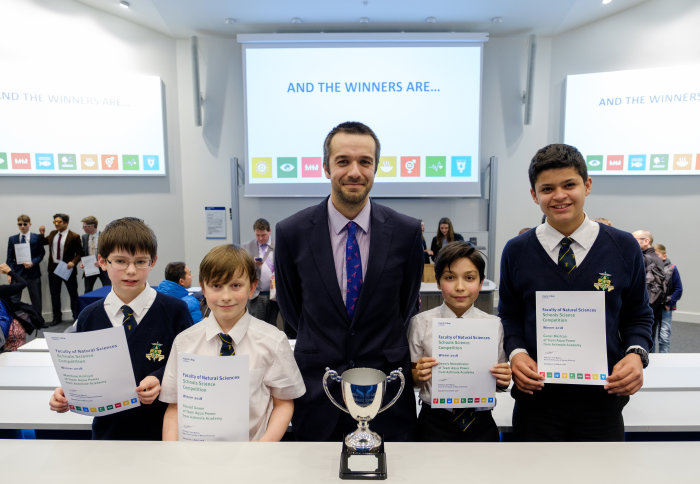School students devise innovative solutions for sustainable development

Winning team 'Aqua Power'
Electricity from algae, squash seed fertiliser, and water to power street lights were ideas to emerge in this year's Schools Science Competition.
Now in its fourth year, the Faculty of Natural Sciences Schools Science Competition is open to teams of pupils from secondary schools across Greater London, and encourages students to come up with new and innovative scientific solutions to specific issues within a given theme.
It was very encouraging to see such a strong interest in science and its practical application to improve the world. Vicky Pope Head of Science and Technology Futures, Met Office
This year’s theme focused on seven of the UN’s Global Goals for Sustainable Development – Zero Hunger, Good Health and Wellbeing, Clean Water and Sanitation, Affordable and Clean Energy, Climate Action, Life below Water, and Life on Land.
Teams were asked to choose one of the Goals and come up with a solution that would help achieve it, before creating a five minute film to explain their idea and the science behind it.
Six teams were invited to present their ideas at a showcase event at Imperial on 21 March 2018 in front of a live audience and a panel of judges.
The winners
The winning team, ‘Aqua Power’ from Ashmole Academy in Southgate, focused on the Global Goal of Affordable and Clean Energy – ensuring access to affordable, reliable, sustainable and modern energy for all.
Their project promoted renewable and clean energy – specifically hydroelectric power – to help combat climate change. The team proposed to develop compact hydroelectric generators that fit into the water outlets in homes or commercial buildings. A small amount of electricity would be generated every time a tap is used, which could help power the home or building.
Possible adaptations of the design include the potential for the generator to be placed in water mains on the street, generating the electricity to power street lights.
The team received a winner’s trophy, individual prizes, plus the opportunity to visit a world-leading science facility in the UK.

The judging panel included Dr Simon Foster, Outreach Officer for the department of Physics at Imperial and a former school teacher, Renee Watson, the founder of The Curiosity Box, the first STEM subscription box in the UK, and Vicky Pope, Head of Science and Technology Futures at the Met Office. The event was opened by Professor James Stirling, Provost of Imperial College London.
Of the winning team, Dr Simon Foster said: “Not only was the solution they proposed innovative and ingenious, it was also explained excellently and with real creativity. The winners are now investigating the possibility of developing this into a business and we were all excited to hear about what the future holds for these fantastic young scientists.”
The runners up
The runners up were ‘Uro-Stars’, a home education group based in Hackney, and ‘Algae and Co’, from Hayes School in Bromley, Kent. ‘Uro-Stars’ chose the Global Goal Zero Hunger. This goal focuses on ending hunger, achieving food security and improved nutrition, and promoting sustainable agriculture. Their project explored how to improve soil quality using a fertiliser generated from urine and squash seeds, in order to grow more food crops without polluting water systems or depleting resources. ‘Algae and Co’ focused on the Affordable and Clean Energy Global Goal. Their project proposed using algae to produce sustainable electricity, providing access to reliable, sustainable and portable low-voltage electricity supplies for remote communities.
The other three finalist teams were: ‘Team Hadron’ from The Heathland School, ‘The Forgotten Chromosomes’ from The London Oratory School and ‘Wimbledon STEAM Team’ from Wimbledon High School for Girls.

Vicky Pope, from the Met Office, said: “The teams all had great ideas for helping to meet the sustainable development goals. They had done some excellent science and research to explore the viability of their ideas and thought about some of the potential problems as well as the benefits.
“It was a privilege to be asked the judge the entries and it was very encouraging to see such a strong interest in science and its practical application to improve the world.”
Article text (excluding photos or graphics) © Imperial College London.
Photos and graphics subject to third party copyright used with permission or © Imperial College London.
Reporter
Jennie Rawling
Communications and Public Affairs